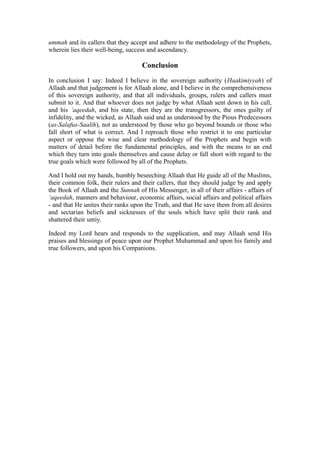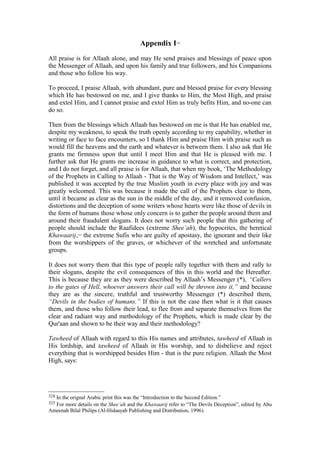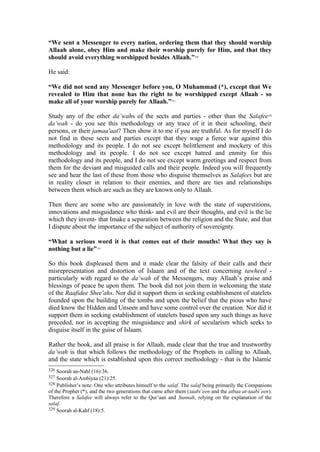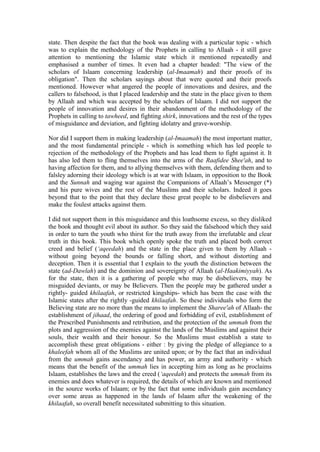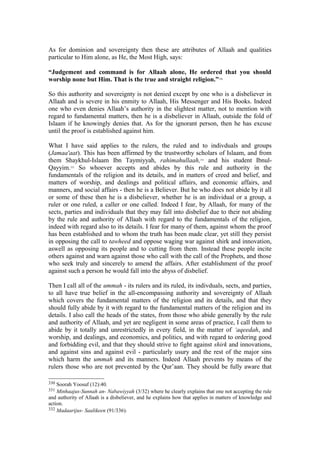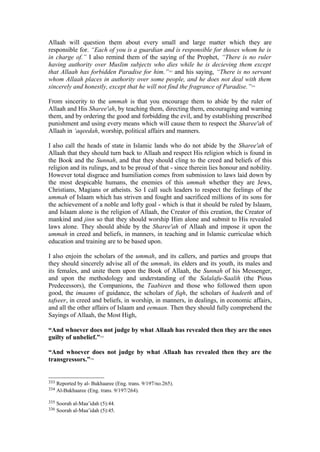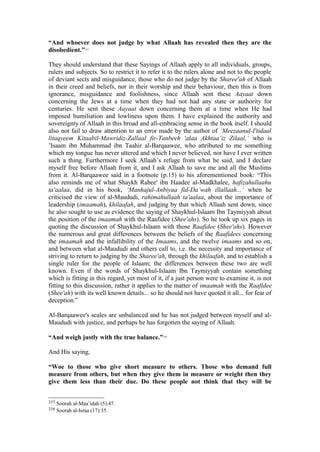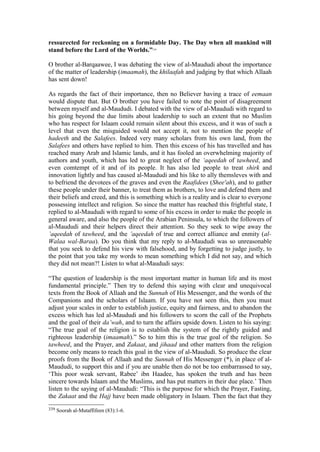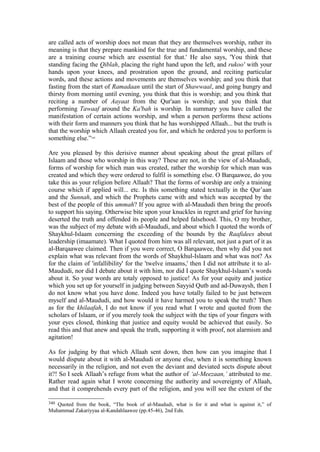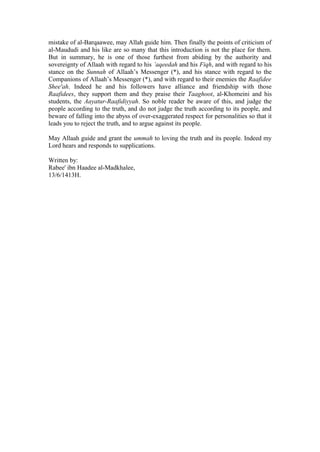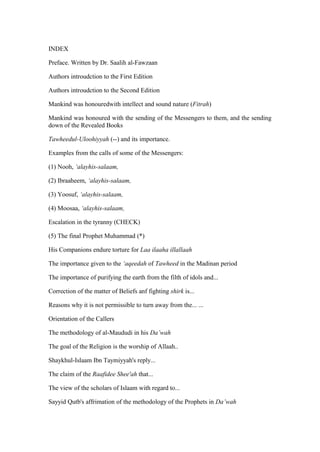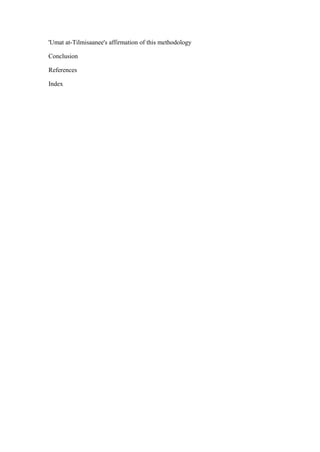This document provides an introduction and preface to a book about calling people to Islam (ad-Dawah ilallaah). It discusses seven pillars that are essential for a correct call to Islam: 1) having knowledge of what is being called to, 2) acting in accordance with it, 3) having pure intentions, 4) beginning with the most important beliefs and duties, 5) persevering patiently in the face of hardships, 6) using good manners, and 7) remaining hopeful that the call will be effective. It notes the Messengers of Allah as the best examples to follow in their preaching methods.
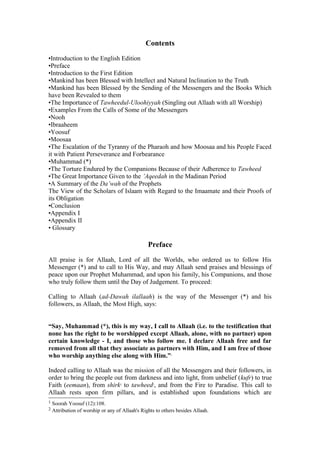
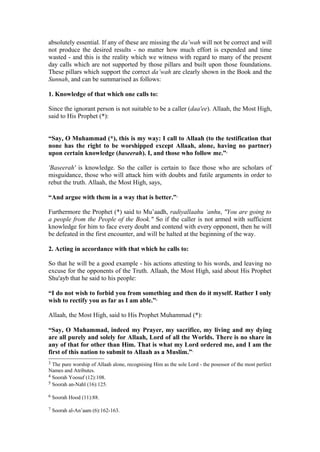
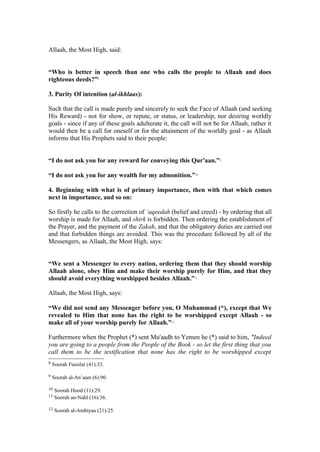
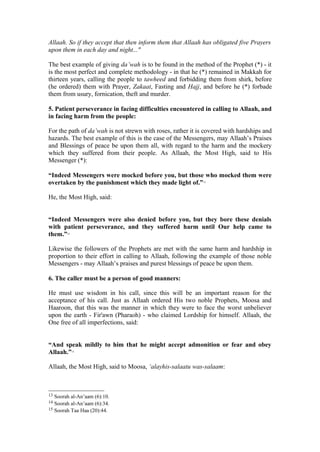
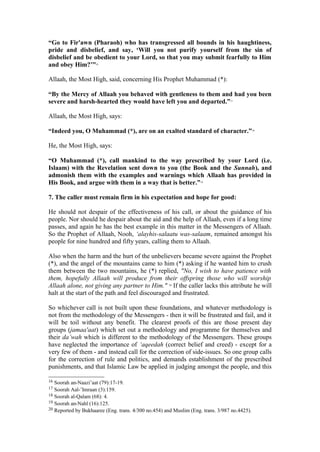
![is indeed something very important, but it is not what is most important - since how
can one seek to establish and apply Allaah’s Judgement upon the thief and the
fornicator before seeking to establish and apply Allaah’s Judgement upon the
mushrik, the one who attributes worship to others besides Allaah?! How can we
demand that Allaah’s Judgement be applied to two men disputing about a sheep
or a camel before demanding that Allaah’s Judgement be applied to those who
worship idols and graves, and those who deny or hold heretical beliefs with
regard to Allaah’s Names and Attributes, divesting them of their true meanings,
or distorting them?! Are these people not greater criminals than those who fornicate,
drink wine and steal?! Those are crimes against mankind, whereas shirk and denial of
Allaah’s Names and Attributes are crimes against the Creator, the One free of all
imperfections, and the right of the Creator has precedence over the rights of the
creation.
Shaykhul-Islaam Ibn Taymiyyah says in his book, al-Istiqaamah (1/466): “So these
sins along with correct tawheed are better than corrupted tawheed in the absence of
these sins.”21
Then another jamaa'ah affiliates itself with da’wah, except that its methodology is
also at variance with the methodology of the Messengers. They give no importance to
correct ‘aqeedah, rather they give importance to worshipping and practising some
dhikr (remembrance of Allaah) in the way of the Sufis.22
They concentrate upon going
out (khurooj) and touring the lands, and what is important to them is that they manage
to attract the people to join them, without caring about their beliefs and creed
(‘aqeedah). All of these are innovated ways, taking as their starting point matters
which were left until last in the call of the Messengers. This is just like the case of one
who seeks to cure a body whose head has been cut off, since the place of ‘aqeedah in
the religion is like the head with regard to the body. So it is necessary for these groups
to correct their concepts and understanding by referring back to the Book and the
Sunnah in order to know the methodology of the Messengers in calling to Allaah. For
indeed Allaah, the One free of all imperfections, informed that correct rule and
sovereignty, which is the central part of the call of the former Jamaa'ah whom we
mentioned, cannot be achieved except after correcting ‘aqeedah such that all worship
is for Allaah alone, and worship of everything else is abandoned. Allaah, the Most
High, says:
“Allaah has promised those who truly believe (have true eemaan) amongst you,
and act in obedience to Allaah and His Messenger, that He will grant them
rulership upon the earth just as He granted it to those before them, and that He
will establish their religion for them, grant them authority to practise the
religion which He chose for them and ordered. And He will certainly change
their situation to one of security, after their fear, providing that they worship
and obey Me, not associating anything else in worship with Me. Then whoever
21 The proof for this is the Saying of Allaah, the Most High, “Allaah does not forgive that partners
should be set up with Him in worship, but He forgives whatever is lesser than that to whom He
pleases.” [Soorah an-Nisaa (4):48]
22 Publisher’s Note: For more information about Sufism refer to “The Reality of Sufism” by
Muhammad ibn Rabee’ ibn Haadee al-Madkhalee (Al-Hidaayah Publishing and Distribution, U.K.,
1995).](https://image.slidesharecdn.com/prophetcalltoallah-200606173033/85/Prophet-call-to-God-6-320.jpg)
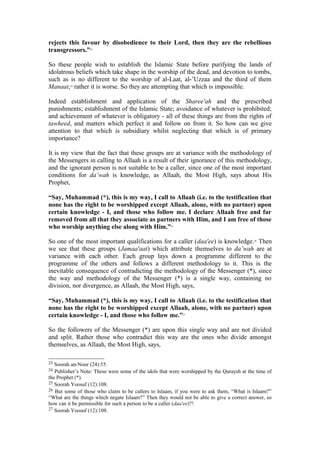
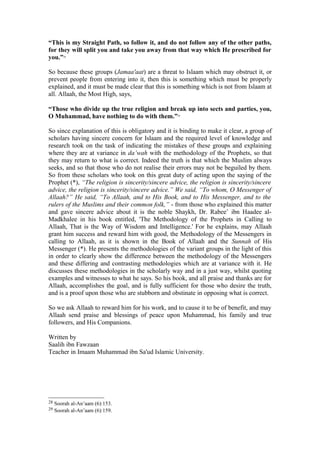
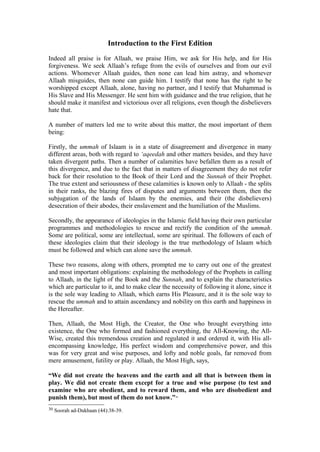
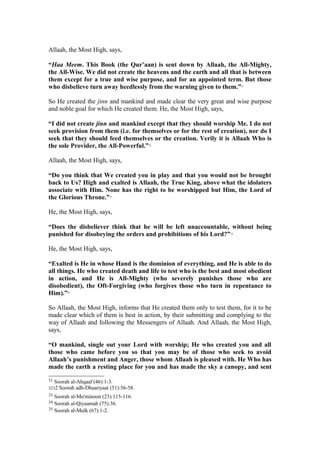
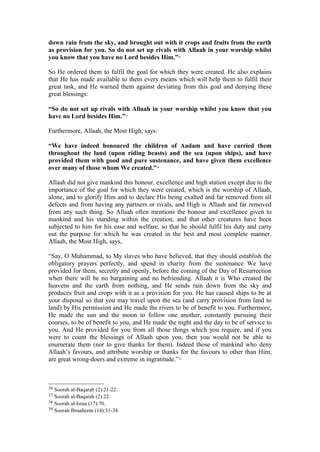
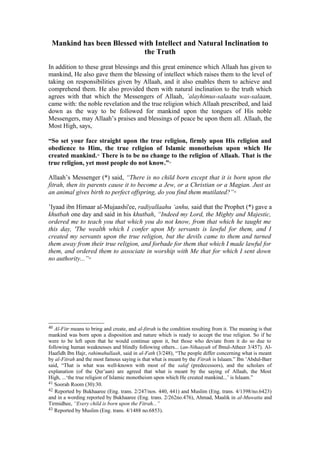
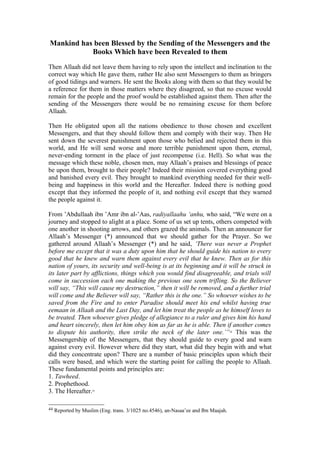
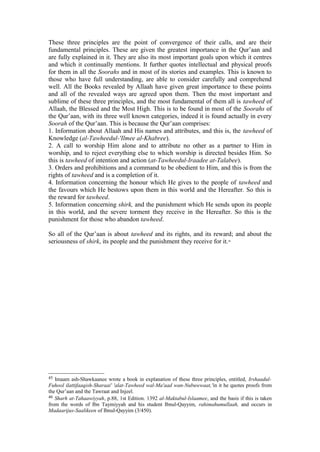
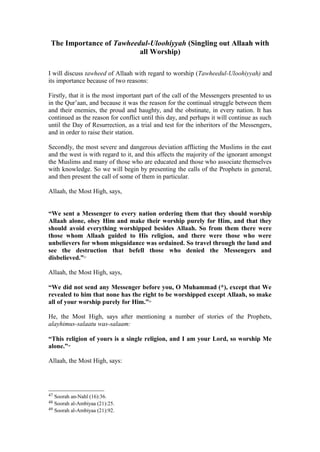
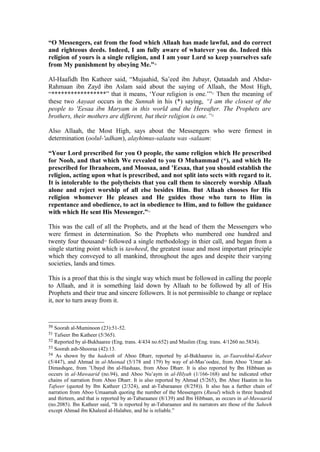
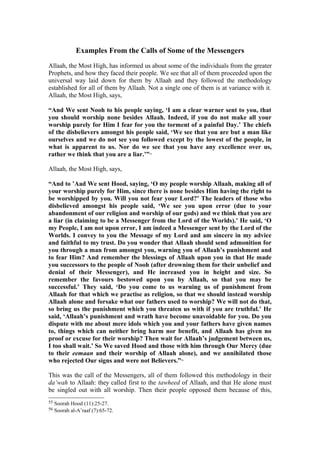
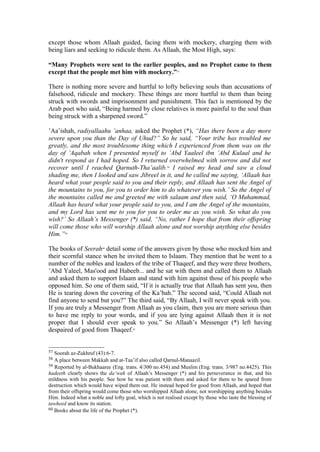
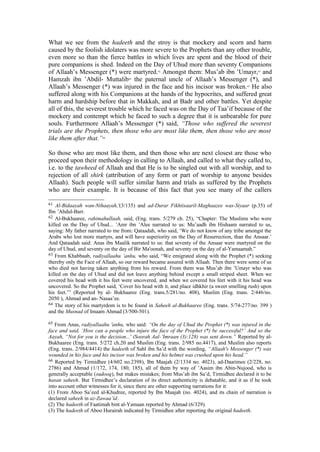
![departing away from this difficult methodology, and this rugged path, since the caller
who follows it will have to face opposition from his mother, his father, his brother, his
friends and those whom he loves. He will be opposed by the society which will treat
him as an enemy and seek to mock and harm him. So many callers divert their
attention to other aspects of Islaam which do have their place, and are not denied by
anyone who truly believes in Allaah, except that those aspects do not involve that
difficulty and hardship and do not bring about mockery and harm particularly in
Islamic societies. This is because the majority of the people of the ummah of Islaam
are willing to gather around these type of callers, and they throw praise and honour
upon them instead of mockery and harm, unless they pose a threat to the rulers and are
a danger to their positions, in which case they suppress them brutally. For example
political parties which oppose the rulers and threaten to dethrone them. In such a case
the rulers will show no love to relatives or friends, Muslims or disbelievers.
Then in any case we say to those callers: no matter how much noise they make, and no
matter how high they raise their voices in the name of Islaam, restrain yourselves
because you have left the way prescribed by Allaah and His Straight Path, upon which
the Prophets and their followers proceeded in calling to tawheed of Allaah and to
making the religion purely for Him. So no matter how much you speak and raise your
voices in the name of Islaam, you are still deviating from the methodology of the
Prophets which was laid down by Allaah. No matter how much effort you expend, and
how much you manage to extend your da’wah and your own methodology, you are
still preoccupying yourselves with the means to the exclusion of the goal. Then what
use are the means67
if they merely harm the goal, and they themselves grow at its
expense.
Indeed woe to those callers who obstinately persist upon the methodologies which
they themselves have innovated, those who fight against the methodology of the
Prophets in calling to the tawheed of Allaah, beneath dazzling banners and slogans
which captivate the simple minded and those ignorant of the methodology and way of
the Prophets.
Then to speak comprehensively about the calls of the Messengers to the tawheed of
Allaah, and the way, and the methodology which they followed, and the terrors and
trials and tribualtions which they faced in that, is something which cannot be dealt
with fully here, so we will suffice with presenting the da’wah of five of them, may
Allaah send praises and blessings of peace upon them, and this will place us upon
clear guidance, whose night is as clear as its day, and is such that no one deviates from
it except that he is destroyed.
67 Rule is a means to calling to Allaah as Allaah, the Most High, says:
“Those who, when We establish them in the land, they establish the Prayer, pay the Zakaat, call
the people to make all of their worship purely for Allaah, and to His obedience and to what is
known by the People of eemaan to be good: And they warn against attribution of partners in
worship to Allaah, and disobedience to Him.” [Soorah al-Hajj (22):41].](https://image.slidesharecdn.com/prophetcalltoallah-200606173033/85/Prophet-call-to-God-20-320.jpg)
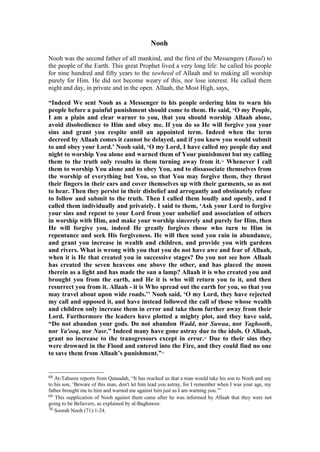
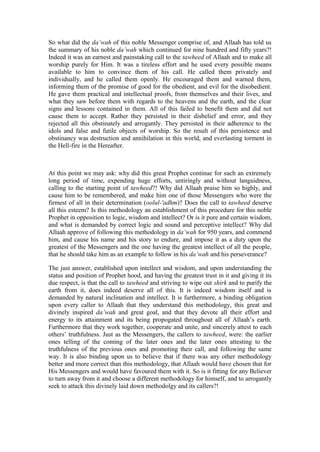
![Ibraaheem
The Father of the Prophets and the Leader of those who worship Allaah alone, upon
the true religion, Ibraaheem, the Chosen and Beloved Friend of Allaah
(Khaleelullaah), who was such that Allaah ordered the best of the Messengers and the
final Prophet, and his ummah, to emulate him, to take his call as an example, and to
follow his way and methodolgy.71
Allaah, the Most High, says:
“And remember when Ibraaheem said to his father Aazar, ‘Will you take idols
for worship? Indeed I see that you and those who worship idols along with you
are upon clear error.’ Likewise We showed Ibraaheem the heavens and the earth
(and how they are a proof that the Creator alone should be worshipped), so that
he should be one of those who have Faith with certainty. So when the night
covered him with darkness he saw a star and said, (as an argument to show his
people the error of worshipping anything besides Allaah), ‘This is (what you
claim to be) my Lord?!’ Then when it set, he said, ‘I do not love that which
passes away.’ Then when he saw the moon rising up he said, ‘This is (what you
claim to be) my Lord?!’ Then when it set he said, ‘If my Lord did not keep me
firm upon the guidance then I would surely be one of the misguided.’ Then when
he saw the sun, he said, ‘This is (what you claim to be) my Lord?! This is greater
than the others.’ Then when it set he said, ‘O my people, I am free from all that
you associate as partners in worship with Allaah. Indeed I have turned my face
in worship to Him who has created the heavens and the earth, making all
worship purely for Him, and I am not from those who worship anything besides
Allaah.’”72
So this was a fervent, vigorous and incessant call to the tawheed of Allaah, and to
make all of religion purely for Him, and to the elimination and rejection of shirk. It
begins with the family and extends to the nations, waging war upon shirk and the idols
and shaking the very foundations of attribution of any worship to the stars. So the
chosen and beloved Friend of Allaah proceeded upon the soundest way in debating
and arguing in order to establish Allaah’s Proof and to refute shirk and to show its
fallacy and reject the doubts used to support it. So his use of the word ‘idols’ shows
contempt for their phoney and supposed gods, and an exposure of their foolishness.
He observed the aforementioned celestial bodies one after the other, each one
succeeded the previous one which set and became absent, in order to use their
condition as a clear proof of the fallacy of their having any divinty or right to worship
as his people claimed. Who was it who protected and guarded them and controlled
their affairs and the affairs of the creation when they passed and set?! Therefore they
must reject the false divinity and right to worship which they claimed for them and
disbelieve in that. It was upon them to wash their hands of them and turn instead to
71 As indicated by the saying of Allaah, the Most High:
“Then We revealed to you, O Muhammad (*), that you should follow the religion of Ibraaheem
who was a Muslim upon the true religion and was not one of those who worshipped idols and
associated partners with Allaah.” [Soorah an-Nahl (16):123].
And the saying of Allaah, the Most High:
“Say, O Muhammad (*): Allaah has indeed spoken the Truth, so follow the religion of Ibraaheem
who was upright, upon the religion of Islaam, and he did not make any share of his worship for
any created being.” [Soorah Aal-’Imraan (3):95].
72 Soorah al-An’aam (6):74-79.](https://image.slidesharecdn.com/prophetcalltoallah-200606173033/85/Prophet-call-to-God-23-320.jpg)
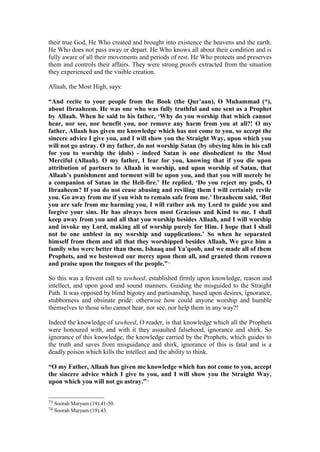
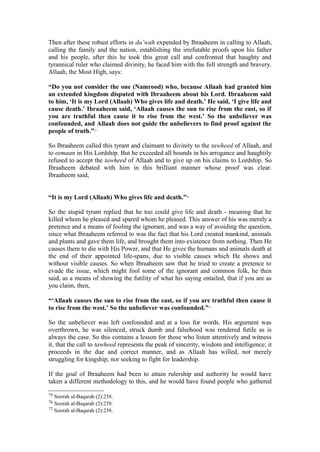
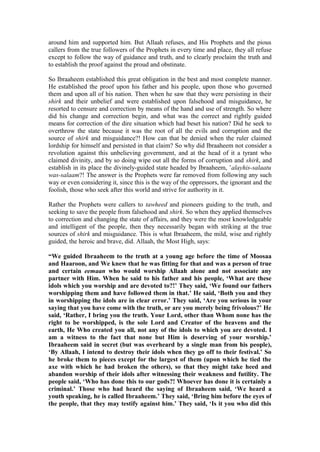
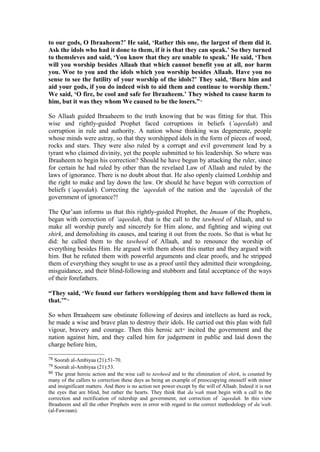
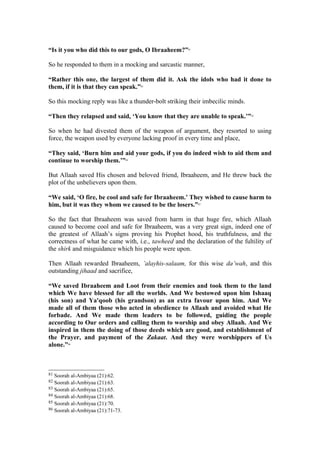
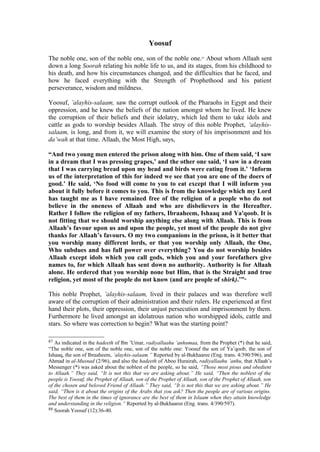
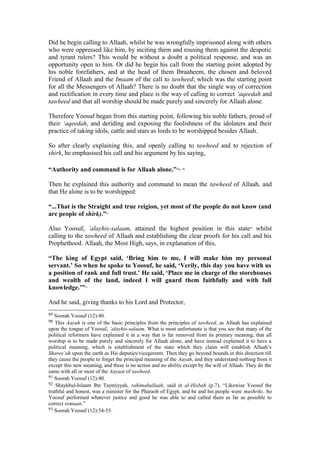
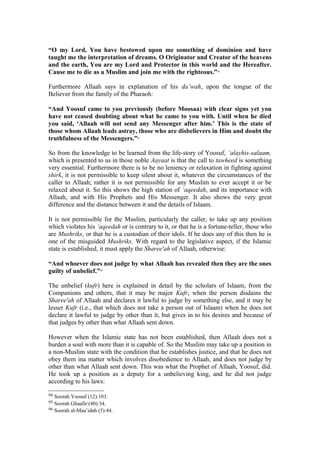
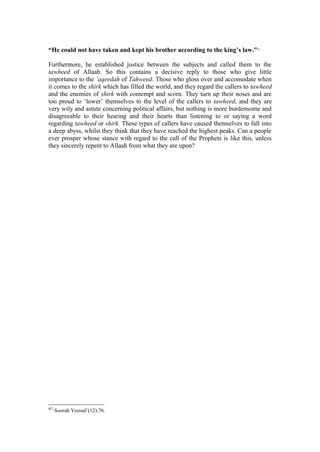
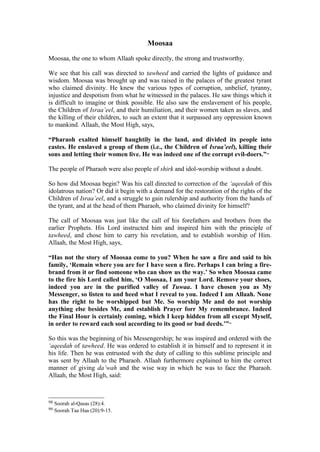
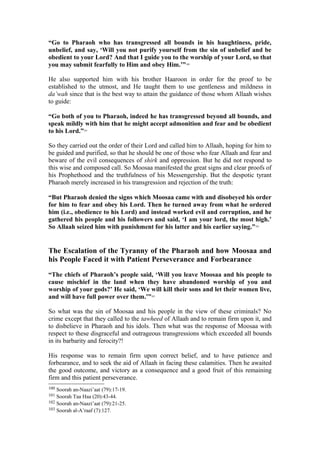
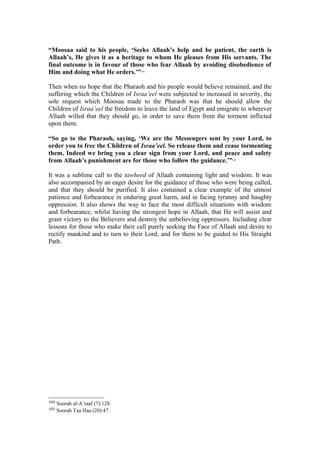
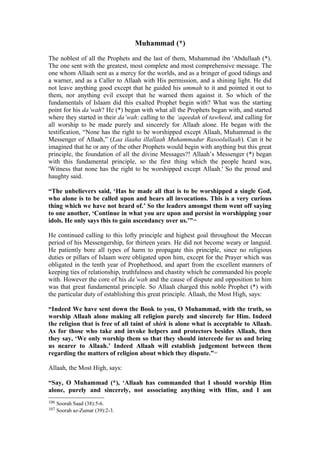
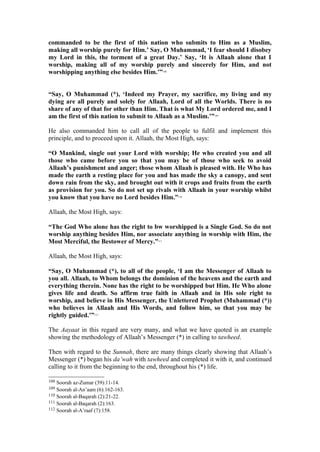
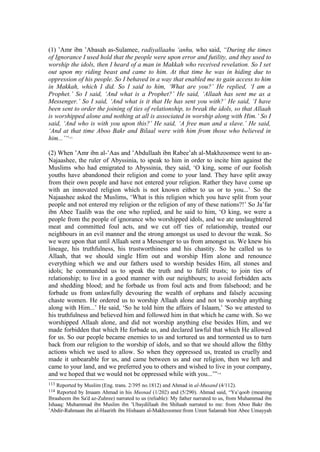
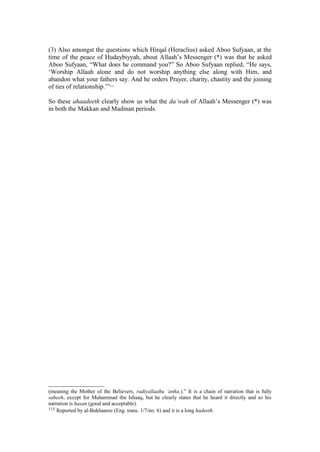
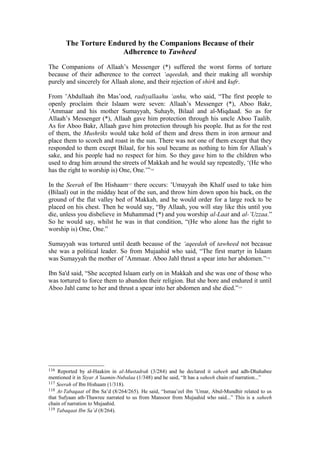
![The Great Importance Given to the ’Aqeedah in the Madinan Period
After Allaah’s Messenger (*) and his Companions migrated to al-Madeenah, and the
Islamic state was established through the efforts of the Muhaajirs and the Ansaar, and
upon the foundation of tawheed, then the greatest importance continued to be given to
tawheed. The Aayaat of the Qur'aan continued to be sent down with it, and the
directions and the orders of the Prophet (*) revolved around it.
(1) Allaah’s Messenger (*) did not suffice even with all this. Rather he used to take
pledge of allegiance from the greater Companions, not to mention the others, upon it
from time to time. Whenever the opportunity arose, he would take their pledge of
allegiance upon it. Allaah, the Most High, says,
“When the Believing women come to give you their pledge that they will not
associate anything in worship with Allaah; nor steal; nor commit fornication;
nor kill their children; nor attribute to their husbands children which are not
theirs; nor disobey you, O Muhammad (*), in that which is good and
commanded by Allaah; (and not wail over the dead), then accept their pledge
and ask Allaah to forgive them. Indeed Allaah forgives those who repent to Him
and is Most Merciful to them.”120
Even though this Aayah is with regard to the women’s pledge, Allaah’s Messenger (*)
also used to take pledge from the men upon its contents.
From ’Ubaadah ibn as-Saamit, radiyallaahu ‘anhu, who said, “Allaah’s Messenger
(*) was in an assembly (of his Companions) and said, ‘Swear allegiance to me with
the pledge that you will not associate anything in worship with Allaah, and that you
will not steal, nor commit fornication, nor kill your children, (and upon the Aayah
which was taken as a pledge from the women [60:12]). So whoever fulfils this pledge
from you, then he will be rewarded by Allaah. And whoever falls into sin with any of
that and is punished for it, then it is an expiation for it. And whoever falls into any of
these sins and Allaah conceals his sin, then it is up to Allaah: if He wills He may
forgive him, and if He wills He may punish him.’”121
Also Ibn Katheer quotes a large number of ahaadeeth that Allaah’s Messenger (*)
used to take pledge from the women upon that which this Aayah contains.122
From
these ahaadeeth is that of ’Aa’ishah; the hadeeth of Umayyah bint Ruqayqah;123
the
hadeeth of Umm ’Atiyyah;124
the hadeeth of Salmaa bint Qays, one of the maternal
aunts of the Messenger (*);125
and the hadeeth of Raa’itah bint Sufyaan al-
Khuzaa’iyyah.126
Then he (i.e. Ibn Katheer) said, “And Allaah’s Messenger (*) used to
120 Soorah al-Mumtahinah (60):12.
121 Reported by al-Bukhaaree (Eng. trans. 1/21/no.17 and 5/151 no.233), and Muslim (Eng. trans.
3/924-925 nos. 4235-4238), and an-Nasaa’ee (7/128).
122 See Saheeh al-Bukhaaree (Eng. trans. 6/385 no.414)
123 Reported by Ahmad (6/357) and an-Nasaa’ee (7/149).
124 Reported by al-Bukhaaree (Eng. trans. 6/386 no. 415).
125 Reported by Ahmad (6/379-380, 422-433) and its chain of narration contains Saleet ibn Ayyoob
about whom al-Haafidh ibn Hajr said, “Maqbool,” (i.e. acceptable if supported), and adh-Dhahabee
said in al-Kaashif (1/388), “Declared reliable by some,” so it is hasan due to its supports.
126 Musnad Ahmad (6/365).](https://image.slidesharecdn.com/prophetcalltoallah-200606173033/85/Prophet-call-to-God-41-320.jpg)
![take this pledge from the women repeatedly.” Then he quoted the hadeeth of Ibn
’Abbaas,127
and other ahaadeeth.
He also used to take this pledge repeatedly from the men. This is indicated by the
hadeeth of ’Ubaadah ibn as-Saamit which has preceded, and also by the hadeeth of
’Auf ibn Maalik al-Ashja’ee, radiyallaahu ‘anhu, who said, “We were with Allaah’s
Messenger (*) and numbered nine, eight or seven people, so he said, ‘Will you not
give your pledge to Allaah’s Messenger?’ So we said, ‘We have already given you our
pledge, O Messenger of Allaah!’ Then he said, ‘Will you not give your pledge to
Allaah’s Messenger?’ So we stretched out our hands and said, ‘We will indeed give
you our pledge, O Messenger of Allaah, but what will our pledge be?’ He said, ‘That
you will worship Allaah and not worship anything else besides Him; the five
obligatory Prayers; that you obey (and he said a word quietly); and that you do not
ask the people for anything.’ So I have as a result seen some of those people, their
whip would fall down from their hand (while riding) and he would not ask anyone to
pick it up for him.”128
(2) He (*) used to send callers, teachers, judges and governors, to kings and tyrants,
and to various areas, calling to tawheed. From Anas, radiyallaahu ’anhu, the servant
of Allaah’s Messenger (*), “The Prophet of Allaah (*) sent letters to Kisraa
(Chosroes), and Caesar, and the Najaashee (Negus) and to every tyrant ruler calling
them to Allaah. And this Negus was not the one whom the Prophet (*) prayed Funeral
Prayer for.”129
This point is shown very clearly by the text of his letter to the Caesar,
and that his purpose was to call to tawheed. Its text is:
“In the Name of Allaah, the Most Merciful, the Bestower of Mercy.
From Muhammad, the Slave of Allaah and His Messenger, to Hiraql, the Emperor of
the Byzantines.
Peace and safety are for those who follow the Guidance. To proceed. I invite you with
the call of Islaam. Accept Islaam and you will be safe, and Allaah will grant you a
double reward. But if you turn your back upon it, then you will carry the burdens of
the sins of your subjects.”130
And he (*) said, “Whoever calls to guidance then there is
for him a reward similar to the reward of those who follow him, nothing being
reduced from their reward. And whoever calls to misguidance, then there is a burden
of sin upon him similar to the sin of those who follow him, nothing being reduced
from their sins.”
127 Reported by al-Bukhaaree (Eng. trans. 6/388 no.418).
128 Reported by Muslim (Eng. trans. 2/498 no.2270), Aboo Daawood (Eng. trans. 2/431 no.1638) and
others...
129 Reported by Muslim (Eng. trans. 3/971 no.4382), at-Tirmidhee (no.2716), and Ahmad (3/336) from
the hadeeth of Jaabir with the wording, “And Allaah's Messenger (*) sent letters five years before he
died to Kisraa and Caesar, and to every tyrant ruler.”
130 i.e. his followers from the weak and others, since he became a reason for their continuing upon
shirk. This is from Allaah’s Justice, and His way with regard to the rulers, that they carry their own
burden of sin and also the burden of sin of those who follow them in deviating from tawheed and the
truth, and fighting against it. Allaah, the Most High, says:
“They will bear the burden of their own sins in full on the Day of Resurrection and the sin of
those whom they lead astray.” [Soorah an-Nahl (16):25].](https://image.slidesharecdn.com/prophetcalltoallah-200606173033/85/Prophet-call-to-God-42-320.jpg)
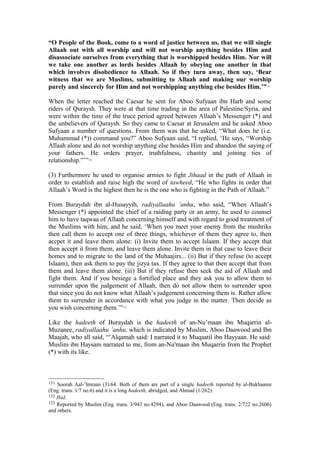
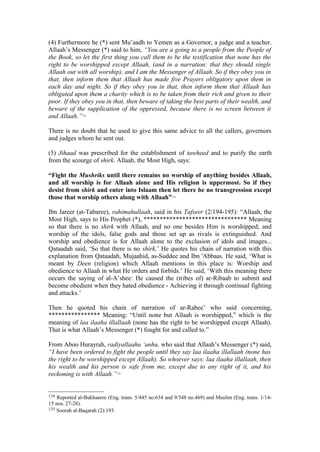
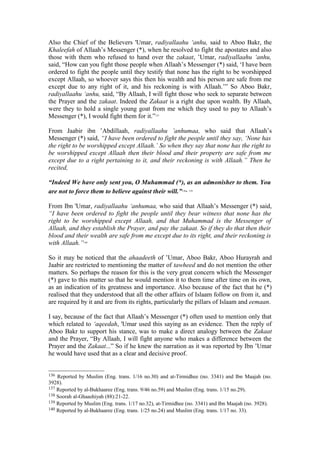
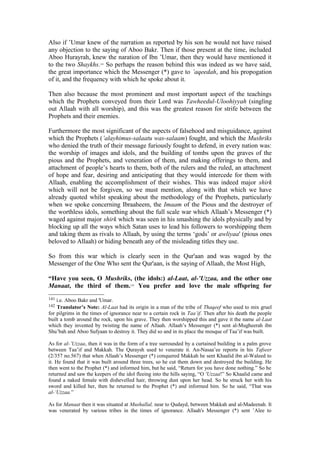
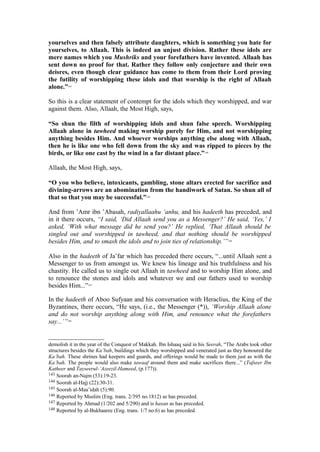
![In the hadeeth of Aboo Umaamah, radiyallaahu ‘anhu, there occurs, “Indeed Allaah
sent me as a mercy for the worlds, and as a guide for the worlds, and my Lord, the
Mighty and Majestic, ordered me to destroy all musical instruments and flutes, and
idols and the cross, and such things from the days of Ignorance...”149
Then the leaders of Quraysh went out of their minds in anger, unable to put up with
the attack of Allaah’s Messenger (*) against their idols, whether it was concerning the
Qur'aan sent down to him, or his da’wah in secret, or his da’wah in the open. This
was something about which there could be no indulgence, and it was something which
had to be due to his true and sincere call.
From Ibn ’Abbaas, radiyallaahu ‘anhumaa, who said, “When Aboo Taalib became ill
a group of Quraysh entered upon him, amongst them Aboo Jahl, and they said, ‘The
son of your brother abuses our gods, and does such and such, and says such and
such. So if only you were to send a message forbidding him.’ So he sent a message
and the Prophet (*) came and entered the house... Aboo Taalib said to him, ‘O son of
my brother! Why is it that your people complain about you? They claim that you
abuse their idols and say such and such?!’ They spoke a great deal against him, and
Allaah’s Messenger (*) spoke and said, ‘O Uncle! I only desire that they should say a
single phrase which if they say it, then the Arabs will become obedient to them and
the non-Arabs will pay the Jizyah tax to them.’ So they were very surprised at what he
said and they said, ‘A single phrase? Yes, by your father, even ten.’ So they asked,
‘And what is it?’ Aboo Taalib said, ‘And which saying is it, O son of my brother?’ So
he (*) said, ‘None has the right to be worshipped except Allaah.’ So they stood up,
shaking their clothes saying, ‘Does he declare that worship should be for a single
God?! this is something bizarre.’”150
Also from Jaabir, radiyallaahu ‘anhu, who said, “The Quraysh gathered together one
day and said, ‘See who is the most knowledgeable of you with regard to sorcery,
divining and poetry, then let him go to this man who splits our united body, causes
schism between us and abuses our religion. So let him speak to him and see how best
to reply to him.’ So they said, ‘We do not know anyone but ’Utbah ibn Rabee’ah.’ So
they said, ‘Then it is to be you O Abul-Waleed.’ So ’Utbah went to him and said, ‘O
Muhammad (*)! Are you better or ’Abdullaah?’151
Allaah’s Messenger (*) remained
silent. ‘Are you better or ’Abdul-Muttalib?’152
Again Allaah’s Messenger (*) remained
silent. So he said, ‘If you claim that they are better than you, then they certainly
worshipped the idols which you abuse. If however you claim that you are better than
them, then speak so that we may hear what you have to say. Indeed we have never
seen a youngster who has boded evil for his people more so than yourself. You have
split our unity and caused schism in our affair, and you have abused our religion and
shamed us in front of the Arabs. It has spread amongst them that there is a sorceror
149 Al-Haithumee says in Majma’az Zawaa’id (5/72), “Reported by Ahmad and at-Tabaraanee and its
chain contains ’Alee ibn Yazeed (i.e. al-Alhaanee) who is weak.” [Translator’s Note]
150 Musnad Ahmad (1/362) and Tirmidhee (no.3232) and its chain of narration contains Yahyaa ibn
’Umaarah and it is said: Ibn ’Abbaad who is mentioned by Ibn Hibbaan in ath-Thiqaat. Ibn Hajr says in
Tahdheebut-Tahdheeb (11/259), “Acceptable (if supported),” and refer to, at-Taqreeb (2/354). Adh-
Dhahabee says in al-Kaashif (3/224), “Declared reliable by some.” It is also reported by Ibn Jareer
(23/165) with his chain of narration to al-A’mash: ’Abbaad narrated to us: from Sa’eed ibn Jubayr:
from Ibn ’Abbaas, and I do not find any biography for ’Abbaad. Its chain of narration also contains
weakness, but may be suitable to be supported to the level of hasan...
151 i.e. the father of Allaah’s Messenger (*). [Translator’s Note]
152 i.e. the grandfather of Allaah’s Messenger (*). [Translator’s Note]](https://image.slidesharecdn.com/prophetcalltoallah-200606173033/85/Prophet-call-to-God-48-320.jpg)
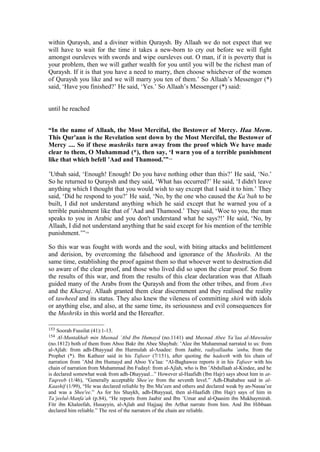
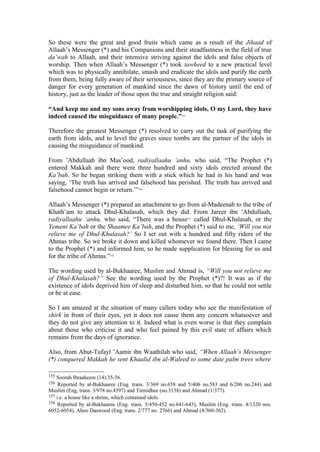
![al-’Uzzaa was to be found. It was constructed around three trees, so he cut them
down and destroyed the building. Then he came to the Prophet (*) and told him, but
he said, ‘Go back, for you have done nothing.’ So Khaalid returned, and when the
keepers of the shrine saw him they fled to the hills, saying, ‘O ’Uzzaa! O ’Uzzaa!’ So
Khaalid came and found a naked woman with bedraggled hair, casting dust upon her
head. So Khaalid transfixed her with the sword and killed her. Then he returned to
Allaah’s Messenger (*) and informed him, so he said, ‘That was al-’Uzzaa.’”159
Also Manaat was the idol worshipped by Aws and Khazraj and those who followed
their religion in Yathrib. So Allaah’s Messenger (*) sent Aboo Sufyaan to demolish it,
or it is said, ’Alee ibn Abee Taalib.160
Furthermore Thaqeef requested that Allaah’s
Messenger (*) leave the major idol, al-Laat, and not destroy it for three years.
Allaah’s Messenger (*) refused. So then they asked him to leave it for a year, but he
continued to refuse. Finally they asked him to leave it for a month only after their
arrival, but he refused to leave it for any period of time. What they wanted by this was
to remain safe from the initial reaction of their foolish people, their womenfolk and
their offspring... but Allaah’s Messenger (*) refused except that he should send Aboo
Sufyaan ibn Harb and al-Mugheerah ibn Shu’bah to destroy it.161
From ’Uthmaan ibn Abil-’Aas, “That Allaah’s Messenger (*) ordered that the mosque
of Taa’if be built in the place where their idol formerly stood.”162
Ibn Jareer said,163
“They extracted its name from the name of Allaah, so they said, 'al-Laat' seeking to
make it feminine, and High is Allaah and far removed from their saying.” He then
reports with his chains of narration from Qataadah, Ibn ’Abbaas, Mujaahid and Ibn
Zayd that al-Laatta was the title of the man who used to produce a broth to feed the
pilgrims. Then when he died they became devoted to his grave, and worshipped it.
Imaam al-Bukhaaree said, Muslim ibn Ibraaheem narrated to us that Abul-Ashab
narrated to us that Abul-Jawzaa narrated to us from Ibn 'Abbaas, radiyallaahu
‘anhumaa, with regard to Allaah’s saying (in Soorah an-Najm)164
“al-Laat was a man
who used to mix broth for the pilgrims.”165
From Thumaamah ibn Shufayy who said, “We were with Fudaalah ibn ’Ubayd in the
land of the Romans at Rhodes and a companion of ours died. So Fudaalah gave orders
concerning the grave, and it was levelled, then he said, ‘I heard Allaah’s Messenger
(*) ordering that they be levelled.’”166
159 Reported by an-Nasaa’ee in his Tafseer within al-Kubraa, as occurs in Tuhfatul-Ashraaf (4/235):
’Alee ibn al-Mundhir related to us: Ibn Fudayl related to us: al-Waleed ibn Juma’i narrated to us... And
this is a hasan chain of narration.
160 The Seerah of Ibn Hishaam (1/85-86).
161 Ibn Hishaam's Seerah (2/540-541), Ibn Jareer (3/140), al-Bidaayah wan-Nihaayah (5/32),
Uyoonul-Athar of Ibn Sayyidun-Naas (2/228) and Zaadul-Ma’aad (3/499-500).
162 Ibn Maajah (no.743) and Aboo Daawood (Eng. trans. 1/117 no.450) and its narrators are reliable
except for Muhammad ibn ’Abdullaah ibn ’Iyaad, who is acceptable if supported.
163 In his Tafseer (27/58-59) and it occurs in Ibn Hishaam's Seerah (pp.78-79), and he speaks at length
about the idols of the Arabs and the things which they used to worship, and the form which their
worship took.
164 “Have you considered al-Laat and al-’Uzza” [Soorah an-Najm (53):19].
165 Al-Bukhaaree (Eng. trans. (6/361 no.382).
166 Reported by Muslim (Eng. trans. 2/459 no.2114), Aboo Daawood (Eng .trans. 2/915 no.3213) and
an-Nasaa’ee (4/88).](https://image.slidesharecdn.com/prophetcalltoallah-200606173033/85/Prophet-call-to-God-51-320.jpg)
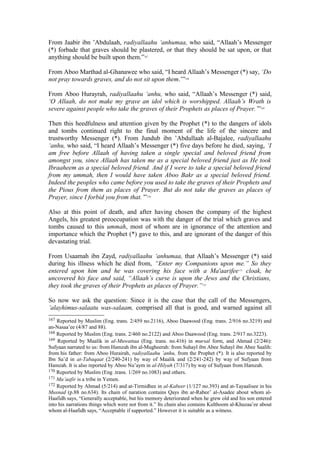
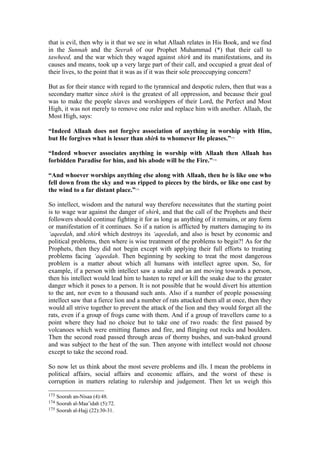
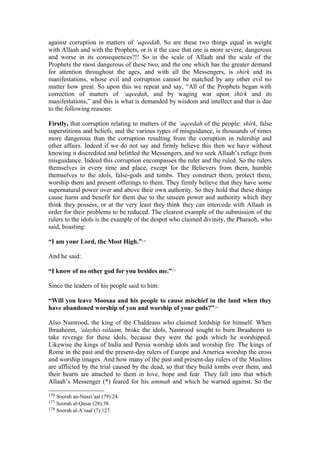
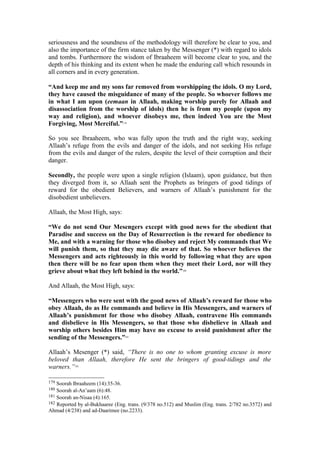
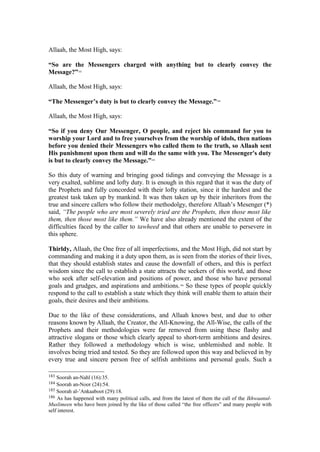
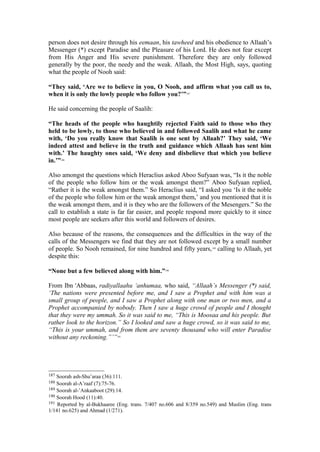
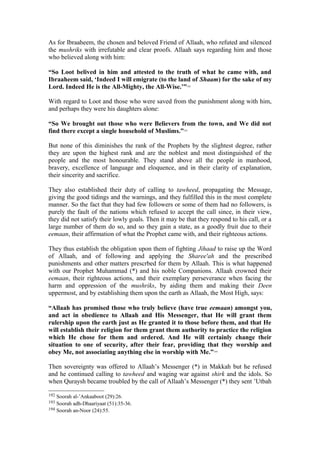
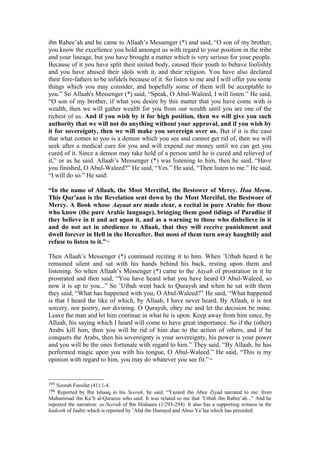
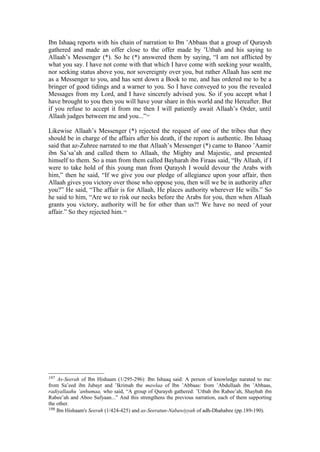
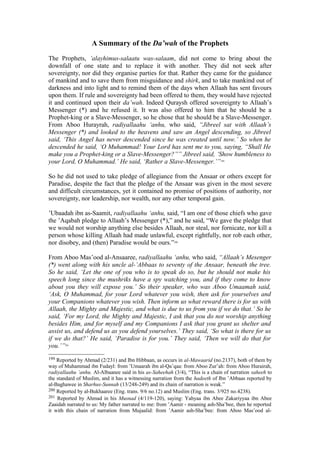
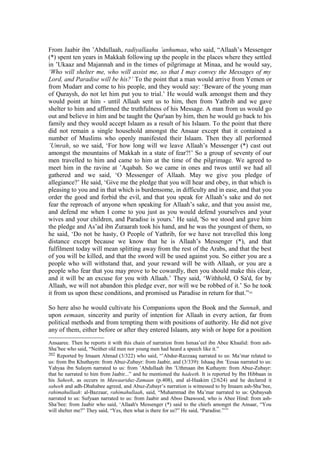
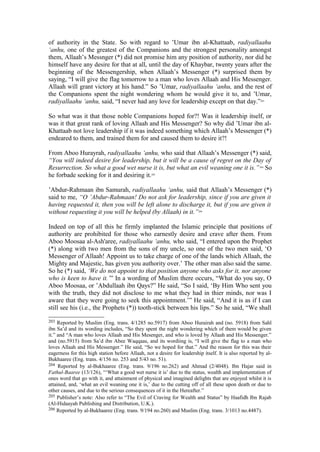
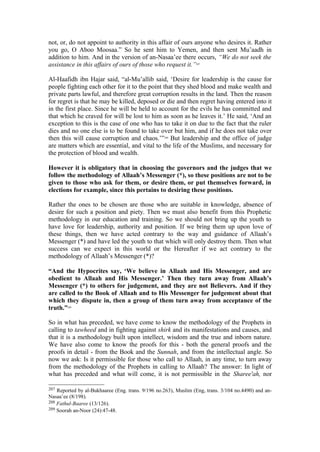
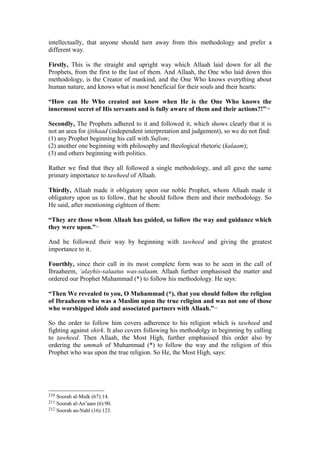
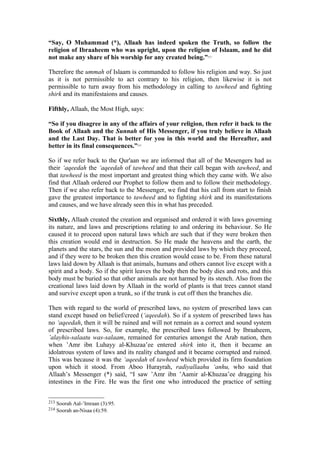
![animals free for the sake of their deities.”215
So Aktham said, “Perhaps the fact that I
resemble him216
will cause harm to me, O Messenger of Allaah?” He (*) said, “No, you
are a Believer and he was an unbeliever. He was the first one who altered the religion
of Ismaa’eel. He created the idols, and established the practice of keeping the milk of
certain animals for the deities, and of freeing animals for the sake of the idols, and of
freeing for their idols the she camels which gave birth to female camels as their first
and second deliveries, and of freeing for their idols male camels completing their
allotted number of sirings.”217
So after ’Amr ibn Luhayy corrupted the ‘aqeedah supporting the Sharee’ah which
Ibraaheem came with and which was followed by Ismaa’eel, then it became an
idalatrous religion, and the Arabs became idol worshippers, even though they
continued to associate themselves and attach themselves to Ibraaheem and his religion
and his code of laws, and even though they still clung to a few remnants of what he
came with such as honouring the Ka'bah, and performing tawaaf around it, and
making hajj and ’umrah, and standing in ’Arafah and Muzdalifah, and making
sacrifices, and other acts of devotion to Allaah. Likewise the message of Moosaa and
’Eesaa was a message of tawheed and a revealed system of laws. But when they lost
their basis of tawheed due to the saying of the Jews: ‘’Uzayr is the son of Allaah,’
then the saying of the Christians: ‘The Messiah is the son of Allaah,’ then they
became religions of unbelievers, which it is not permissible to attribute to Allaah, nor
to those noble Prophets.
Allaah, the Most High, says:
“Fight those who do not believe in Allaah, and do not believe in the Hereafter,
nor make unlawful that which Allaah and His Messenger declare unlawful, nor
obey Allaah truly by following Islaam, from the People of the Book (Jews and
Christians), until they pay the jizyah tax in a state of being subdued and debased.
For the Jews said that ’Uzayr is the son of Allaah and the Christians said that
the Messiah is the son of Allaah. That is merely the false saying of their tongues,
like the saying of the idolaters before them. Allaah’s curse is upon them. How
can they deviate from the truth which is manifest?”218
From Aboo Sa'eed al-Khudree, radiyallaahu ‘anhu, from the Prophet (*) who said,
“On the Day of Resurrection a caller will call out that every nation should follow that
which it used to worship. So none will remain from those who used to worship others
besides Allaah, idols and false deities, except that they will fall into the Hell-Fire
until none remain except those who used to worship Allaah, the righteous and the
impious, and the remainder of the People of the Book. So the Jews will be called and
it will be said to them: ‘Whom had you used to worship?’ They will say: ‘We used to
worship ’Uzayr, the son of Allaah.’ So it will be said to them: ‘You have lied, Allaah
215 Reported by al-Bukhaaree (Eng. trans. 6/116/no.148) and Muslim (Eng. trans. 2/426/no.1966 and
4/1485/no.6839) and Ahmad (2/257).
216 i.e. physical resemblance. [Translator’s Note]
217 Ibn Hishaam said in his Seerah (1/76): Ibn Ishaaq said: And Muhammad ibn Ibraaheem at-Taymee
narrated to me that Aboo Saalih as-Sammaan narrated to him that he heard Aboo Hurairah say: I heard
Allaah's Messenger (*) say... and mentioned the hadeeth. So Ibn Ishaaq clearly states that he heard it
directly, and the rest of the narrators are reliable so it is a hasan (good) chain of narration at the very
least.
218 Soorah at-Tawbah (9):29-30.](https://image.slidesharecdn.com/prophetcalltoallah-200606173033/85/Prophet-call-to-God-67-320.jpg)
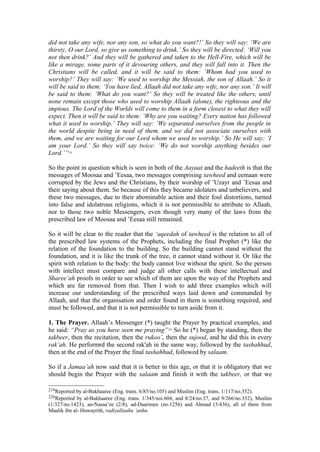
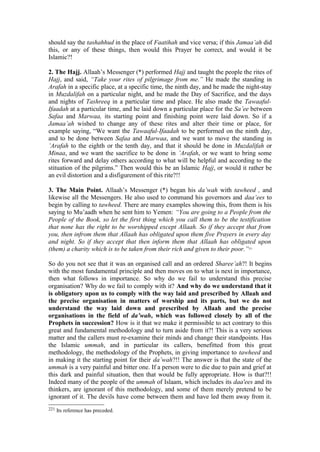
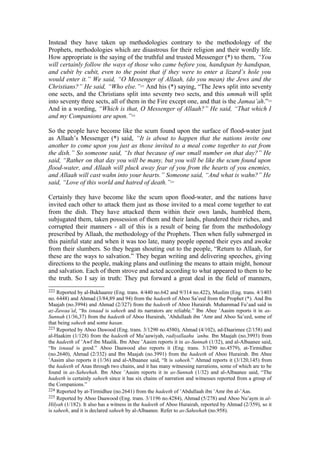
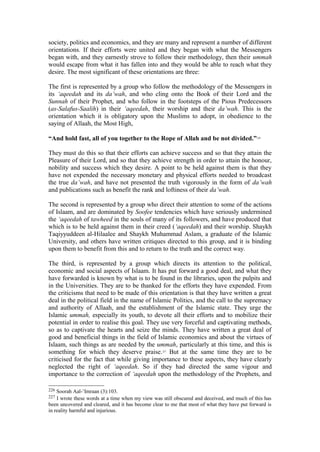
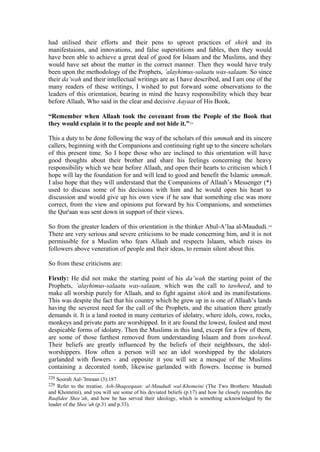
![around it and it is dressed with silk. The Muslims come to them with the utmost
devotion, with extreme fear, humility and respect, along with their belief that the
pious in the graves know the Hidden and the Unseen and have some control over the
creation.230
So have you ever seen a land upon Allaah’s earth throughout history, in the
present or the past, having a greater need for da’wah to tawheed than this land?!
Secondly: He gave most importance to the political aspects and this took up a very
large proportion of his da’wah, and gave it a greater emphasis than that given to it by
Islaam and which was understood by the scholars of the Salaf of this ummah, the
scholars of hadeeth and Fiqh, and he laid down for himself and his followers a goal
not laid down by Allaah and His Messengers, and which He did not make a duty upon
them or their followers, since it is beyond human capability. Maududi said, speaking
about this goal:
(a) “Perhaps it has become clear to you from our books and treatises that the final
goal which we aim for in our present struggle is to cause a revolution overthrowing
the leadership, and what I mean by that is that which we wish to attain and be
successful in achieving in this world , is to purify the earth from the filth of wicked
leaders and their supremacy, and to establish the system of pious and rightly-guided
leadership (imaamate). So this continuous struggle and striving is seen by us to be the
greatest and most effective way of attaining the Pleasure of the Lord, the Most High,
and of seeking His Face, the Most High, in this world and the Hereafter.”231
Hopefully the bright, intelligent and knowledgeable reader who memorises the
Qur'aan and recites it during the night and at each end of the day, and considers the
call of the Prophets, from the first to the last of them, will not know that this is
supposed to be the goal of the Messengers for which they struggled. Nor will he
understand that this striving and effort is the greatest and most effective way of
attaining Allaah’s Pleasure and seeking His Face. Rather the greatest and most
effective way of attaining the Pleasure of the Lord is by following the methodology of
the Prophets in their da’wah, and following in their footsteps by purifying the earth of
corruption and shirk, and the greatest means is eemaan with its well-known pillars
and Islaam with its pillars which are also well known.
Then232
Maududi knows fully well the state of the people of India with regard to their
ignorance of Islaam and the innovations and misguidance which they are upon. He
knows full well that there is within them remnants of the beliefs, manners and
customs of their previous religions. He has himself has spoken about this in his book
“Waaqi’ul Muslimeen-wa-Sabeelun Nuhood-Bihim” (The State of the Muslims and
the Means for their Revival), in a section in which he talks of the shortcomings and
negligence of the rulers with regard to Islamic education, and that the institutions that
are established for education only benefit the higher and middle levels of people. He
said, “The ignorant and the deluded have continued in a state of total ignorance about
the teachings of Islaam, deprived to a great extent of its effect of reform and
rectification. The reason for this is that non Muslims used to enter into Allaah’s
230 A person such as this is not termed a Muslim, unless he does it out of ignorance, and has not had the
proof established against him. (al-Fawzaan)
231 Al-Usasul-Akhlaaqiyah lil-Harakatil-Islaamiyyah, p.16.
232 This portion of the text, beginning here until point (b), was missed from the printed Arabic version
and was inserted upon the instructions of Shaykh Rabee’ (the author) from his handwritten manuscript
copy. [Publisher’s Note]](https://image.slidesharecdn.com/prophetcalltoallah-200606173033/85/Prophet-call-to-God-73-320.jpg)
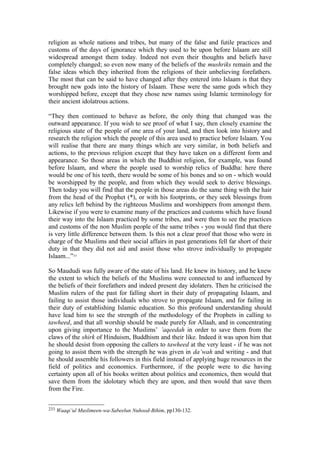
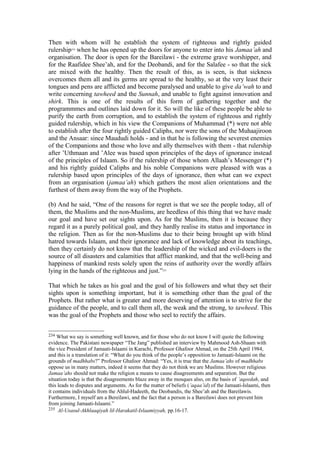
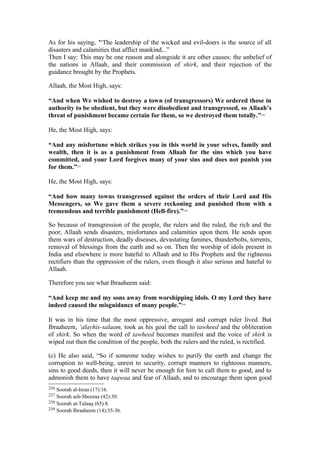
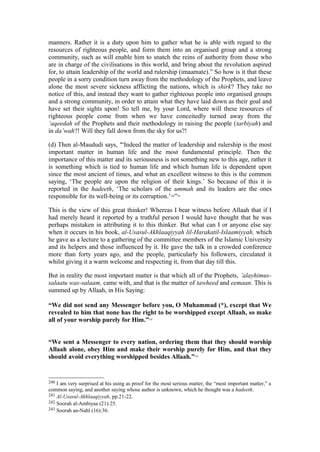
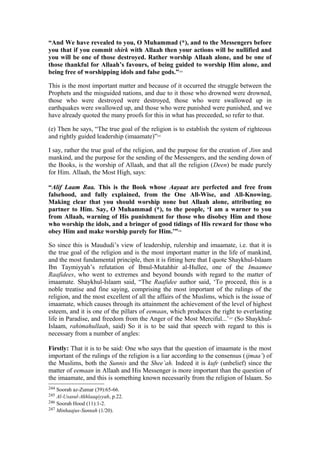
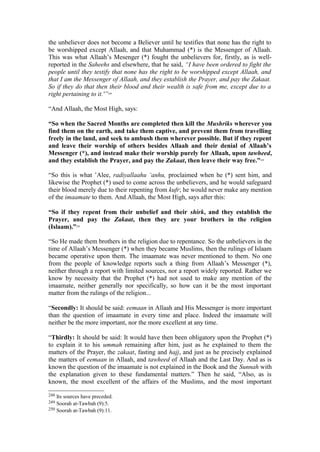
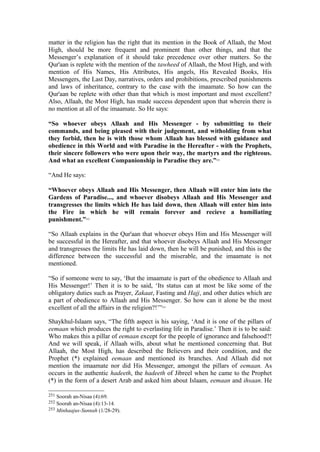
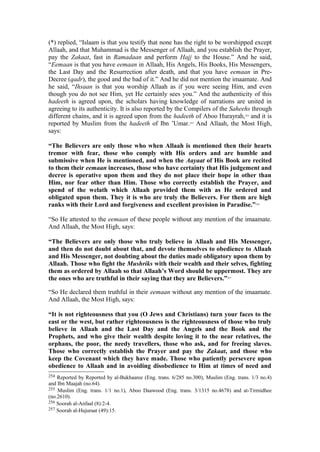
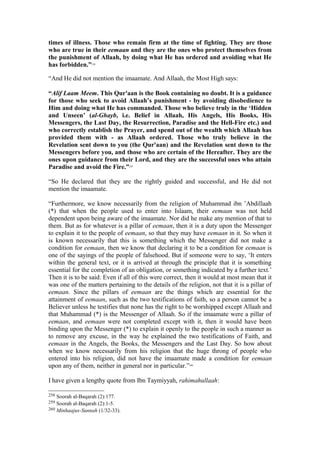
![1 - Due to his being one of the foremost scholars of the religion, and his standing and
the trust which the people have for the strength and depth of his understanding of
Islaam, and their belief in his sincerity.
2 - Due to the similarity between the claims of Maududi and the claim of the Raafidee
Shee’ee. Indeed it is very unfortunate that the reader will see that the claims of
Maududi are even greater than the Shee’ee who said, “It is the most important of the
rulings of the religion,’261
and he said, “And it is one of the pillars of eemaan.”
Whereas Maududi declared it to be, “The most important question in human life and
the most important principle,” and, “The most important goal of the Prophets,” as will
follow.
3 - My intention is to give sincere advice to the Muslim youth so that they may cling
to the way and guidance of their Prophet, and from my advice to them is that they
should not merely seek to make a comparison between Rabee’ and Maududi, but
rather they must raise the importance they give to the Qur'aan, the Speech of their
Lord, and raise the importance they give to the Sunnah of their Prophet. Then they
should not equate the speech of any human with them, no matter what position and
status they hold. This is what is demanded by eemaan and is a proof of a person’s
sincerity.
261 i.e. he did not say that it was the most important of the fundamentals of the Religion. [Translator’s
note]](https://image.slidesharecdn.com/prophetcalltoallah-200606173033/85/Prophet-call-to-God-83-320.jpg)
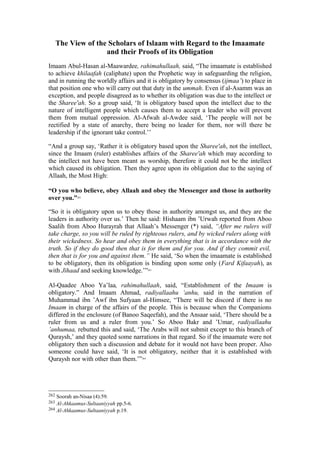
![Imaamul-Haramayn said, “The matter of imaamate pertains to the details [of Islaam]
(al-Furoo').”265
So you see what they say with regard to the imaamate, that it is from the details (al-
Furoo'), and is no more than a means. So it is there for the protection of the religion
and for the running of the worldly affairs. Then there is disagreement about the proof
for its obligation: is it the intellect or the Sharee’ah? We indeed hold that it is an
obligation, but the two proofs quoted by al-Maawardee are not direct texts with regard
to the imaamate, since they are more general than the matter of the imaamate and they
refer to the obligation of obedience to rulers already established in authority, and
likewise with the hadeeth. So perhaps Aboo Ya’laa left them aside because he saw
that they are not clear proofs for this matter. Anyway, how can it be said about a
matter like this, where there is difference about the proofs for its obligation, that it is
the true goal of the religion, and the most important role of the Prophets... and the rest
of the exaggerations said about it? These sayings have over-inflated this matter and
give to it a far greater importance than its true importance, and have at the same time
reduced the importance of ‘aqeedah and of the religion itself.
Maududi said, “Therefore the goal aspired for in the Messengership of the Prophets,
’alayhimus-salaatu was-salaam, in this world did not cease to be the establishment of
the Islamic Government upon the earth. Through this they could establish the
complete system for human life which they brought from Allaah.”266
I say:
Firstly: It is not possible to speak about the Messengers of Allaah and His Prophets
based upon political conclusions and deductions. Rather the life stories of the
Prophets and their histories are matters of the Hidden and Unseen which it is not
possible to go into except when there is a text sent down as Revelation by Allaah to
Muhammad (*). Allaah, the Most High, says at the beginning of the story of Yoosuf,
‘alayhis-salaam:
“We narrate to you, O Muhammad (*), the best of narratives about the past
nations in this Qur'aan sent down, and before its revelation you did not know
anything about that.”267
Allaah, the Most High, says after the story of Nooh, ‘alayhis-salaam:
“This story which We have informed you of is one of the affairs of the Unseen
which you did not witness or know about, which We reveal to you. Neither you
nor your people knew this previously. So patiently persevere in accomplishing
the command of Allaah and conveying the message, just as Nooh patiently
persevered. Indeed the good outcome is in favour of those who are obedient to
Allah, doing what He has ordered and avoiding what He has forbidden.”268
Then this prohibition is even more severe when these political conclusions are
contrary to what Allaah has informed about them. So Allaah has explained what their
goal was in summary, saying:
265 Mugheethul-Khalq p.9.
266 Tajdeedud-Deen p.34.
267 Soorah Yoosuf (12):3.
268 Soorah Hood (11):49.](https://image.slidesharecdn.com/prophetcalltoallah-200606173033/85/Prophet-call-to-God-85-320.jpg)
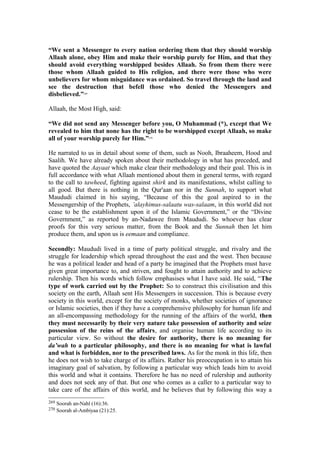
![person will attain salvation and success, then he must strive hard to attain the reins
of rulership and authority, since as long as he does not have the required power to
enforce his particular way, then it can never be established in the real world.”271
Maududi studied modern society and civilisation in all its branches and details, or
most of them, and he believed that the Prophets had a society and civilisation
comprising the same branches and details as those existing in present-day organised
societies, except that they were different in their branches and details as those existing
in their branches and details from the socieities and civilisations of ignorance
(Jaahiliyyah). Then upon this belief he built the idea that every society having a
comprehensive theory for life and an all-embracing methodology for running the
affairs of the world, that they must by their very nature take possession of authority
and seize possession of the reins of control of the affairs. Then the Prophets came
with a society and civilisation of this type, and their society and civilisation must
therefore take possession of authority and seize the reins of control of the affairs. They
must strive and work hard to attain the reins of rulership and therefore, “The goal
aspired for in the Messengership of the Prophets, ’alayhimus-salaatu was-salaam, in
this world did not cease to be the establishment upon it of the Islamic Government,
and to enforce upon it that complete system for human life which they brought from
Allaah.”
So hopefully it will have become clear to the reader that these conclusions are based
upon intellectual and political analogies and deductions. They are not based upon
proofs from the Qur'aan and the Prophetic Sunnah, and this is an area requiring Divine
Revelation, not a place for intellectual and political discoveries.
Also he was under the false impression that people were of only two classes: Either a
monk whose sole preoccupation is to reach his imaginary salvation...etc. and far
removed are the Prophets from being of this type. However they may be similar, in the
view of the people of politics, to the present-day scholars and callers: those who do
not ride on the wave of politics, nor plunge into its hazards. Rather they follow the
methodology of the Prophets in calling to Allaah, and of tawheed of Him, and that all
worship should be made purely for Him, and warning against shirk, sins, innovation,
with the wisdom of the Sunnah and with fine manners and preaching, and they are not
infallible.
Then the other type of person is the one with political aspirations and cultural thinking
who wishes to take the ummah to the highest levels of culture and society, and he
wishes to establish the strongest state for his ummah.272
Then the Prophets are the most
eminent and highest ranking of the people so they must, in his view, be of this distinct
class. But it escaped him that the Prophets were a special independent class, neither
belonging to these nor those. Rather they are people distinct and free from the folly of
271 Tajdeedud-Deen pp.32-33. He spoke at length about the civilisations and societies of the Prophets.
So there is truth in part of what he said, and some of it is doubtful and in need of proofs, from the one
who does not speak from his desires. So from these matters (i.e. which he attributes to them [transl.]) is
his saying, “Organisation of the positions and offices in the branches of civil government, and the
fundamentals of the laws, and derivation of detailed principles from these fundamentals, and
organisation of the systems of justice, the policy and accounting, and levying taxes, and the section of
economics and general works, and production, and business, and organisation of publications,
information, education, organisation of civil-servants, training and organisation of armies, and the
affairs of peace and war, and international relations and foreign affairs.”
272 Even if it is devoid of tawheed and established upon innovations and false beliefs.](https://image.slidesharecdn.com/prophetcalltoallah-200606173033/85/Prophet-call-to-God-87-320.jpg)
![the monks and their ignorance, and also from the aspirations of the people of politics
and their sly tricks and devilish means which they use to attain authority. The
Prophets are the people who have their souls purest and furthest removed from
personal ambitions, and they are those with the highest intellects, and the best
characters, and the purest in their descent and lineage. They were chosen and preferred
by Allaah for the guidance of mankind, and to rescue them from misguidance. So they
committed themsleves fully to the field of calling to Allaah with full sincerity and
selflessness. They did not desire any reward of wealth, status or sovereignty for that.
Rather they only sought the Face of Allaah, and the Hereafter, and they bore patiently
the various types of harm which would not be borne by other than them. Maududi
however says, “Therefore every Prophet and every Messenger strove to cause a
political revolution. So the efforts of some of them were limited to preparing the way
and amassing the number of people required, such as Ibraaheem, ‘alayhis-salaam;
others actually managed to start revolutionary movements, but their Messengership
finished before the Divine Government could be established at their hand, such as
'Eesaa, ‘alayhis-salaam; and some of them managed with this movement to attain the
level of success and victory, such as Moosaa, ‘alayhis-salaam, and our noble leader
Muhammad (*).”
Firstly: The number of Prophets and Messengers is in excess of a hundred and twenty
thousand273
and Allaah only narrated to us the stories of about twenty-five of the
Prophets and Messengers in the Qur’aan. Allaah, the Most High, says:
“And Messengers about whom We have narrated to you previously, and
Messengers about whom We have not narrated to you, and Allaah spoke directly
to Moosaa.”274
Allaah, the Most High, says:
“And We sent, O Muhammad (*), Messengers before you. We have narrated to
you the stories of some of them, and We did not narrate to you the stories of
others of them.”275
So what is obligatory upon us is that we believe in all of the Prophets and Messengers
and their Books generally and comprehensively, and in those and their Books which
Allaah mentioned in particular, then we believe in them as they were named to us.
With regard to those whom we are not informed of, and those whose stories were not
narrated to us by His Messenger Muhammad (*), then this is from the affairs of the
Hidden and Unseen. Then I believe that the like of sayings such as, “Therefore every
Prophet and every Messenger strove to cause a political revolution...”276
is not from the
knowledge inherited from the final Prophet (*), rather it is from the greatest affairs of
the Hidden and Unseen which was kept hidden from Allaah’s Mesenger (*) by Allaah.
So how can anyone else know it? Indeed we say: How is it permissible for any
Muslim to speak about this when Allaah, the Most High, has said:
273 As indicated in the hadeeth of Aboo Dharr, radiyallaahu ’anhu, which has preceded. [Translator’s
note]
274 Soorah an-Nisaa (4):164.
275 Soorah Ghaafir (40):78.
276 Tajdeedud-Deen p.35.](https://image.slidesharecdn.com/prophetcalltoallah-200606173033/85/Prophet-call-to-God-88-320.jpg)
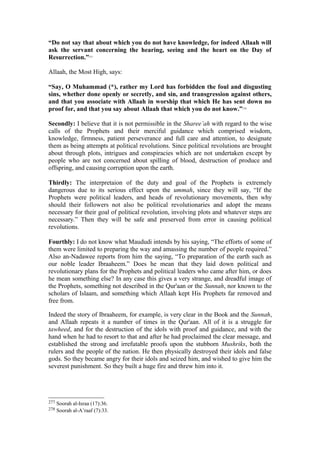
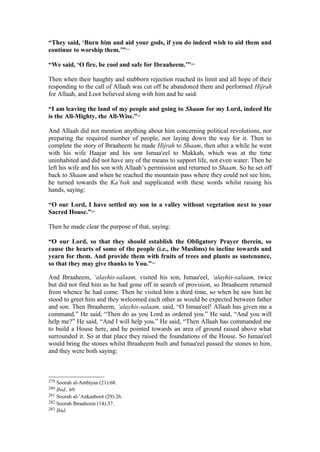
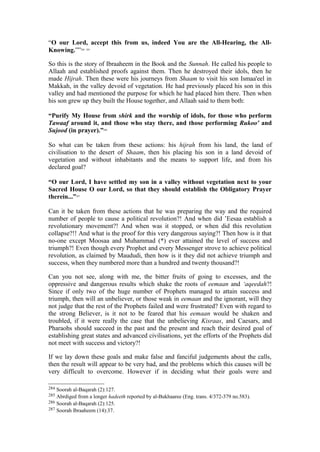
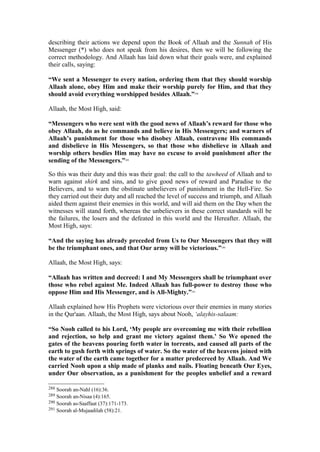
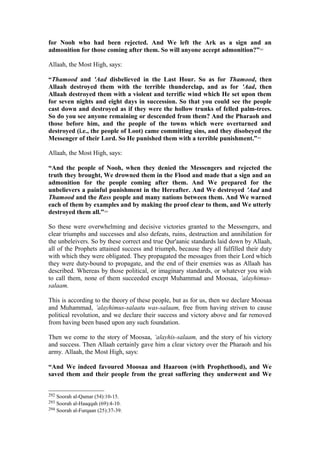
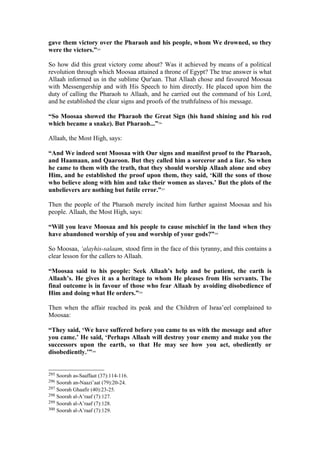
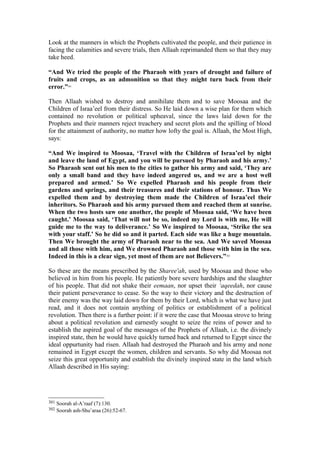
![“How many gardens and springs, crops and stations of honour, and bounties
which they enjoyed did the Pharaoh and his people the Copts leave behind,”303
and instead he went to reside in the Sinai desert without any state, any authority or any
divinely-inspired government?! Therefore we have to say: Moosaa was indeed a noble
and great Messenger, and from the strong and firmly resolute, and he carried out his
Messengership in the most perfect and complete manner. At his hand, Allaah
destroyed the despotic tyrant Pharaoh and his army, and with him Allaah saved the
Children of Israa’eel, and this is sufficient honour and excellence for him, and
sufficient for him is the victory he acheived over the Pharaoh and his people.
Then as for Muhammad (*), then he was a man of ‘aqeedah from the first instant and
a Messenger of guidance. He patiently bore that which mountains could not bear,
whilst conveying this ‘aqeedah, He was offered sovereignty at the beginning and he
refused it and the victory and the establishment of the State of Islaam which Allaah
gave him came only as a reward for his patient perseverance, his taqwaa and his
forbearance. So it was a message and a call and then its resulting fruit, not a political
revolution. Far from that, how far from that he was, and we have already explained his
call in some detail so there is no need to repeat that.304
Then a further point of criticism of that orientation in general is that they lay down a
principle which is that, “Islaam is a whole and cannot be divided up.” And it is a great
principle,305
if only it were followed by the methodology of the Pious Predecessors (as-
Salafus-Saalih) without committing excesses. But unfortunately you find that they
seriously contradict it because their strong attachment to the establishment of the
Islamic State (and they call it: The Call to the Sovereign Authority of Allaah (al-
Haakimiyyah)) has preoccupied them from giving importance to the foundation of
Islaam , which is tawheed with all its categories. And to this time they have not
realised, due to that preoccupation, that the necessity of giving full importance to the
call to tawheed is just as pressing and urgent as it was in the time of the Messengers,
including Muhammad (*), if not more so. So can any intelligent and just person deny
this?! Then can any alert and attentive Muslim say or believe that the Muslims today
are like the Muslims in the time of the preferred and best generations, not taking their
beliefs and their acts of worship except from the Book and the Sunnah. Indeed the call
to the sovereign authority (al-Haakimiyyah) of Allaah and its application is an
important matter, and something important for every Muslim who understands Islaam
(if its conditions are kept in mind), and everything which Allaah’s Messenger (*)
came with is important and serious.
But we need to ask the question, “Does the call to Allaah’s sovereign authority (al-
Haakimiyyah) necessitate neglect of or falling short with regard to the most
fundamental principle of Islaam?” The answer is, “No!” The fact of Allaah’s
sovereign authority (al-Haakimiyyah) must be applied beginning with the greatest of
the affairs of Islaam, which is correct Belief (‘aqeedah) with regard to Allaah, and His
Majestic Names and perfect Attributes, with which Allaah has described Himself and
made Himself known to us in His tremendous Book, and as was taught to us by our
303 Soorah ad-Dukhaan (44):25-27.
304 The fifth example from the examples of the Messengers. [Translator’s Note]
305 However, unfortunately, they give precedence over it to another principle, “We will co-operate in
what we agree upon, and will excuse one another about those things where we disagree.” This is a very
broad statement which covers all differences whether in fundamental matters or points of detail,
comprehending all the sects which claim attachment to Islaam.](https://image.slidesharecdn.com/prophetcalltoallah-200606173033/85/Prophet-call-to-God-96-320.jpg)
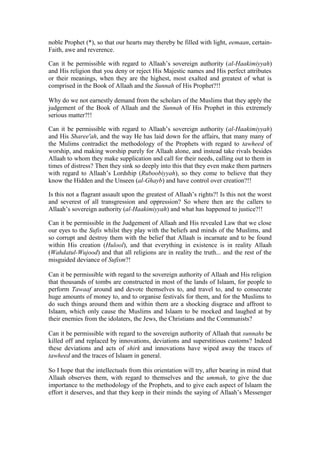
![(*), “That Allaah should guide through you a single man is better for you than red
camels.”306
It also used to be said to me, “These matters (the innovations and the acts of shirk) are
things which have come to an end and been buried.” But we see that they are still
alive and still remain as secure as ever, and there are schools and governments which
support them and protect them. They also have their own 'priests,' 'rabbis' and
custodians. So why is it that we do not explain to the Muslims that these actions of
jaahiliyyah contradict the sovereign authority of Allaah?! And why do we not
call those guilty of such actions to submit to the Judgement of Allaah, and to
submit to the sovereign authority of Allaah in all these spheres?!
So if our brothers who give such importance to the sovereign authority of Allaah
realise and are certain that those who do these actions and hold such beliefs are
contradicting the sovereign authority of Allaah and are not submitting to it in these
things, then let them set to work earnestly and apply their full efforts to this area, and
let them lay down plans of action, found schools, write books, and let the supports of
the minbars quake with forceful speeches and correct guidance for correction of this.
And I believe that if Ibraaheem, Nooh, Moosaa, Muhammad and all their brothers
from the Prophets and Messengers, salawaatullaahi wa salaamuhu 'alayhim, were to
come, along with all of the Companions, that they would not follow except their
methodology which is reported from them in the Qur'aan; and they would obliterate
the presence of these elevated tombs and every manifestation of shirk and
misguidance. And Muhammad (*) would order the companions of theological
rhetoric307
and the Philosphers and all the sects who have deviated from the Qur'aan
and the Sunnah to return to the Qur'aan and the Sunnah and, “By Allaah, if Moosaa
were to come it would not be correct except for him to follow me.”
Do you think that these are unimportant and insignificant matters?
“And you think that it is a harmless matter but it is something very serious with
Allaah.”308
But the matter is not as they suppose or as they are told, indeed the corruption
caused by the evil scholars, the priests and the rabbis, and the leaders of
innovation is worse and more dangerous than the corruption caused by the
rulers and others, since the people are deceived and taken in by them, so that
they love them and trust their words and the way which they are upon. So they
follow them and because of them stray from the way laid down by Allaah.
Look at the Qur'aan which guides to what is right and proper and cures diseases and
dangers with full knowledge, since it is Revelation sent down by One who is All-
Knowing, All-Wise, Worthy of All-Praise. The Prophet (*) lived in the same time as
the Jews who had no state and were covered with humiliation and misery. So how
many are the Aayaat that were sent down concerning them, and how many are the
306 Reported by al-Bukhaaree (Eng. trans. 5/43 no.51) and Muslim (Eng. trans. 4/1285 no.5918).
307 ’Ilmul-Kalaam: Establishment of matters of belief ('aqeedah) by means of argument and debate,
which they call ‘intellect’, instead of by means of textual proof, this being the way of the Mu’tazilah,
Ash’arees, Maatureedees and others who stray from the way of the followers of the Sunnah.
[Translator’s Note]
308 Soorah an-Noor (24):15.](https://image.slidesharecdn.com/prophetcalltoallah-200606173033/85/Prophet-call-to-God-98-320.jpg)
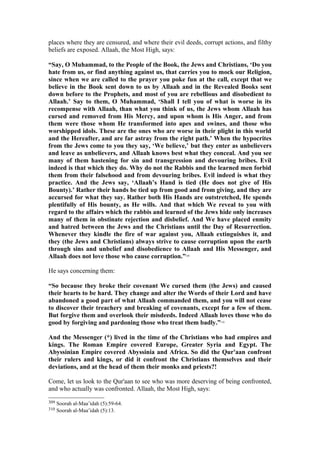
![“And We took a covenant from the Christians that they would obey Me, fulfil the
obligatory duties, follow and believe in My Messengers. But they abandoned a
good part of the covenant they were commanded with. So We planted enmity
and hatred between them till the Day of Resurrection. And Allaah will soon
inform them, when they return to Him, of their breaking their covenant, their
altering His Book and His Commandments, and will punish them as they
deserve.”311
And He said concerning the Jews and the Christians:
“And the Jews and the Christians said, ‘We are the sons of Allaah and His
beloved.’ Say to those liars, ‘Then why does your Lord punish you for your
sins?’ Rather you are human beings from those whom He created. He pardons
whomever He wills by His grace and He justly punishes whomever He wills. And
to Allaah belongs the dominion and control of the heavens and the earth and
everything between them, and everything will return to Him.”312
Allaah, the Most High, said:
“They have taken their learned men and their Rabbis as lords besides Allaah,
and also the Messiah, the son of Mary. But they were not ordered except to
worship Allaah alone. None has the right to be worshipped except Him. How free
and far removed is Allaah from the partners they associate with Him.”313
And 'Adiyy ibn Haatim entered upon Allaah’s Messenger (*) when he was reciting
this Aayah, so he said, “By Allaah, O Messenger of Allaah, we do not worship them
(i.e. the priests and rabbis)’ So he said to him, “Do they not declare forbidden things
to be lawful, and so you declare them to be lawful, and they declare lawful things to
be forbidden, and so you declare them to be forbidden?” He said, “Yes.” He said,
“That is worship of them.”314
He said with regard to the Jews and the Christians:
“O you who believe in Allaah and His Messenger and affirm tawheed of your
Lord: Many of the learned men and the Rabbis, from the Jews and the
Christians, devour the wealth of men whilst changing the Book of Allaah,
writing books with their own hands and claiming it to be from Allaah and then
taking a small price for that; and they hinder people from entering into Islaam.
And those who hoard up gold and silver and do not spend in the way of Allaah,
then give them the tidings of a painful punishment on the Day of
Ressurrection.”315
311 Soorah al-Maa’idah (5):14.
312 Soorah al-Maa’idah (5):18.
313 Soorah at-Tawbah (9):31.
314 Reported by Ahmad and at-Tirmidhee. [Translator’s Note]
315 Soorah at-Tawbah (9):34.](https://image.slidesharecdn.com/prophetcalltoallah-200606173033/85/Prophet-call-to-God-100-320.jpg)
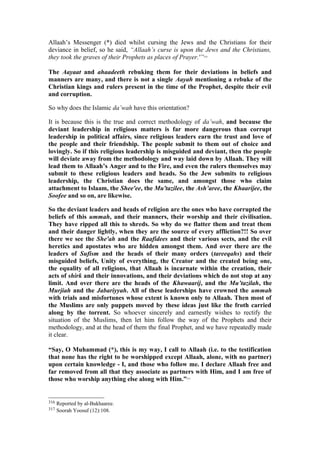
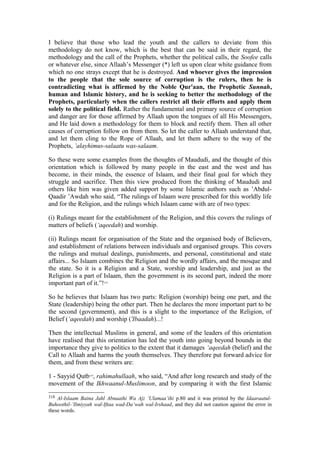
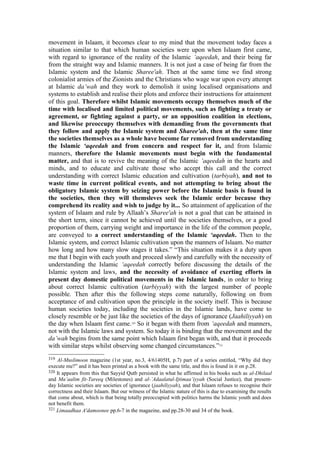
![So these words from Sayyid and others is something good and correct which is a
withdrawal from preoccupation with politics. However, unfortunately, Sayyid and
others did not withdraw from mistakes in ‘aqeedah and thinking which are still read
and studied... so this has made it necessary that we should warn against Sayyid’s
mistakes in thinking and ‘aqeedah in a special treatise, may Allaah facilitate its
printing.322
2 - ’Umar at-Tilmisaanee, rahimahullaah, having been dismayed by the total
preoccupation of the youth with the political side and lack of attention and importance
for the other aspects of Islaam said, “However, unfortunately, whilst I am writing this
at the beginning of the eighties, the work of the youth in the field of Islaam is
restricted to the political aspect which takes up the greatest share of their efforts, and
has caused them great strain and has caused them to lose a great deal. It is as if
nothing is counted as being from the Call of Allaah except the political
aspect!....” Then he said, indicating the reasons which led them to preoccupation with
politics, “And there is no doubt that continual political events and the means through
which successive governments sought to solve them, imposed themselves upon Egypt
to the extent that they forced the Muslim youth to give their view about them and to
suggest the solution. And whoever prevents the University students from thinking and
giving their view about what affects their country internally and externally, then he is
preventing them from a natural right of theirs...” Then he said, “However, at the same
time, I criticise the University students for the fact that they almost entirely restrict
their efforts and attention to the political side, and to using means which are not to be
approved of. They do not establish a conference in the University or in al-Azhar or in
any other place except for the political goals. Then would that they were objective in
these conferences. This is something which they must understand and keep to...”323
So at-Tilmisaanee was correct in his criticism of this going overboard with regard to
the political aspect, but he fell short in appraisal of its causes. Indeed, there is no
doubt that what he mentioned is from the causes, but there are more important reasons
producing a stronger effect upon the minds and emotions of the youth. These are the
political thoughts which they grow up on, like the thoughts of al-Maududi which we
have discussed in what has preceded in this treatise, and that was only a small part of
a great deal from his writings and the writings of others from the leaders of this
orientation.
So if it is the case that even some of the leaders of this oreintation have realised the
craving of the youth for politics and their excessiveness in it to the point that, “They
almost entirely restrict their efforts and attention to the political side, and to using
means which are not to be approved of,” as at-Tilmisaanee said, then why do they not
re-examine, out of mercy upon this youth, their training (tarbiyyah) systems and those
dangerous political thoughts which must be studied carefully in the light of the Book
and the Sunnah, and whatever agrees with the Book and the Sunnah is to be
confirmed, and whatever does not agree with them is to be abandoned?
It is essential that the ummah is cultivated upon the correct ‘aqeedah, and this must be
the foundation and starting point. And we ask Allaah that He grants the Islamic
322 The first Arabic edition of Adwaa Islaamiyyah 'alaa ’Aqeedah Sayyid Qutb wa fikrihi was printed
in 1414H and is a book of 238 printed pages, printed by Maktabatul-Ghurabaa in al-Madeenah.
[Translator’s Note]
323 Al-Mawhoob Ustaadhul-Jeel p.90.](https://image.slidesharecdn.com/prophetcalltoallah-200606173033/85/Prophet-call-to-God-104-320.jpg)
